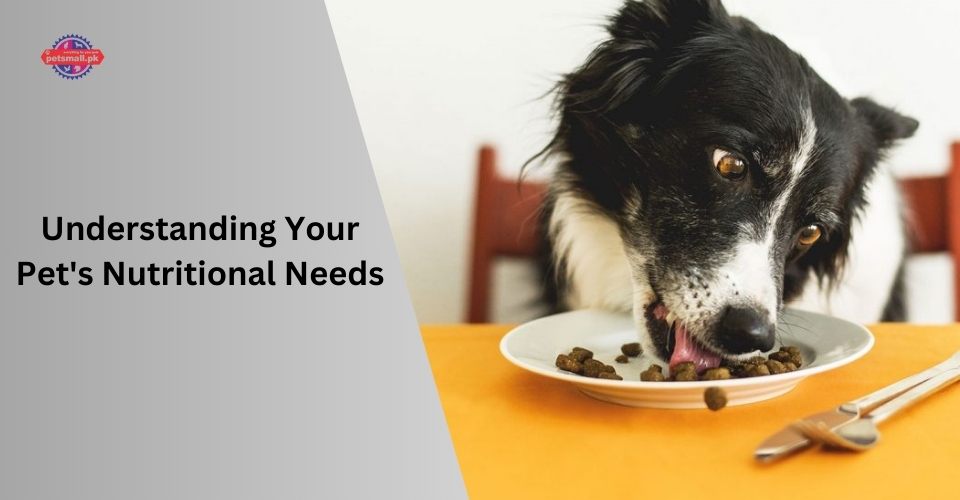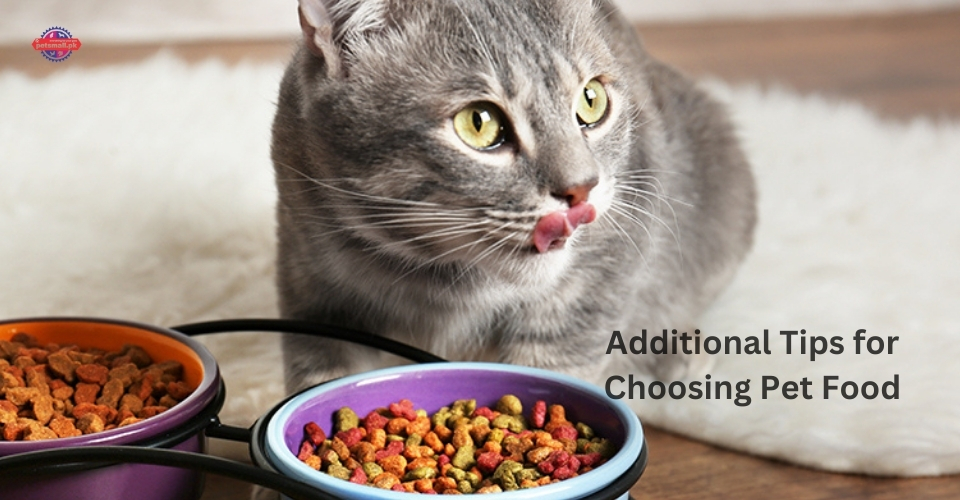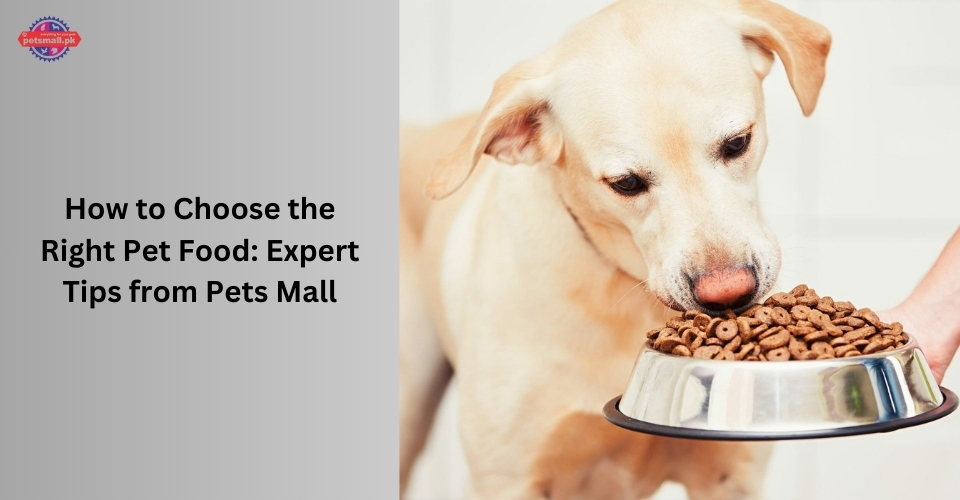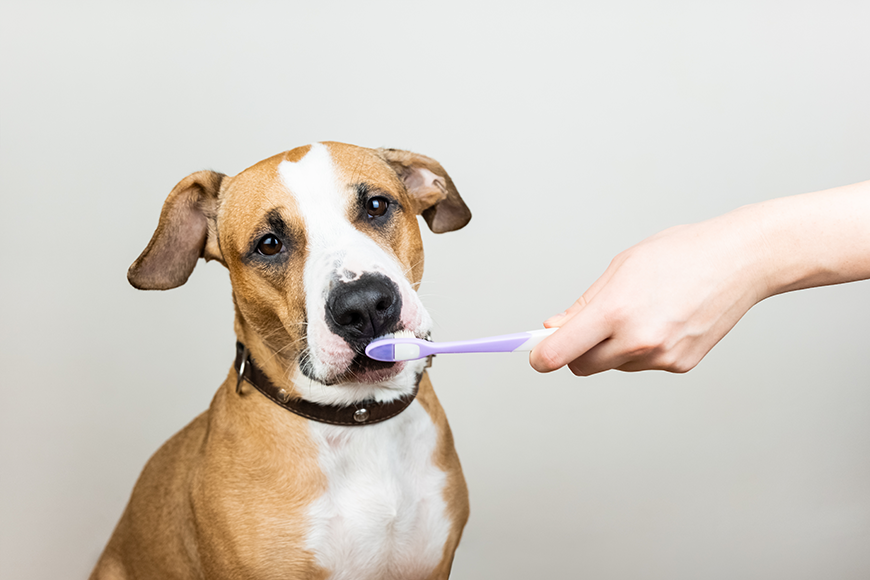As a pet owner, one of the most important decisions you will make is choosing the right food for your furry friend. With a plethora of options available in the market, it can be overwhelming to determine which food will best meet your pet’s nutritional needs. At Pets Mall, we are passionate about pets and believe they deserve the best care, love, and products to lead happy, healthy lives.
In this comprehensive guide, we will provide expert tips on how to choose the right pet food, ensuring your beloved companion receives the nutrition they need.
Understanding Your Pet’s Nutritional Needs

Before diving into the specifics of pet food, it’s essential to understand your pet’s unique nutritional requirements. Different factors influence these needs, including:
Life Stage:
Puppies and kittens have different nutritional requirements than adult and senior pets. Puppies require more protein and calories to support their rapid growth, while senior pets may need diets that are lower in calories but higher in fiber to aid digestion.
Breed:
Different breeds have varying nutritional needs. For example, large breed dogs may require specific nutrients to support joint health, while small breed dogs may need more calorie-dense food due to their higher metabolism.
Health conditions:
Pets with specific health issues, such as allergies, diabetes, or kidney disease, may require specialized diets. Always consult with your veterinarian to determine the best dietary plan for your pet’s health status.
Types of Pet Food
When it comes to pet food, there are several types to consider, each with its own benefits and drawbacks:
Dry Food (Kibble):
This is one of the most popular choices among pet owners due to its convenience and shelf stability. Dry food is typically more affordable and can help maintain dental health by reducing plaque buildup.
However, it may not provide the moisture that some pets need, especially those prone to urinary issues.
Wet Food (Canned or Pouch):
Wet food is often more palatable for pets and contains higher moisture content, which can be beneficial for hydration.
It can be a great option for pets that are picky eaters or those that require additional hydration. However, it can be more expensive and may require refrigeration after opening.
Raw Food:
A raw food diet consists of uncooked meat, bones, and vegetables. Proponents of raw feeding argue that it mimics a pet’s natural diet and can lead to improved coat condition and energy levels.
However, raw diets can pose risks of bacterial contamination and may not provide balanced nutrition without careful planning.
Grain-Free Food:
Grain-free diets have gained popularity, especially among pets with food allergies. These foods eliminate common allergens like corn, wheat, and soy, replacing them with alternative carbohydrates such as sweet potatoes or peas.
However, recent studies have raised concerns about potential links between grain-free diets and heart disease in dogs, so it’s essential to consult with your veterinarian before making a switch.
Key Ingredients to Look For
When selecting pet food, it’s crucial to read the ingredient list carefully. Here are some key ingredients to prioritize:
High-Quality Protein:
Look for named protein sources, such as chicken, beef, or fish, as the first ingredient. These provide essential amino acids necessary for your pet’s growth and maintenance.
Whole Grains:
If your pet can tolerate grains, opt for whole grains like brown rice, oats, or barley. These ingredients provide fiber, vitamins, and minerals that support digestive health.
Vegetables:
Ingredients like sweet potatoes, carrots, and peas are excellent sources of vitamins and minerals. They also provide fiber, which aids in digestion.
Fruits:
Fruits such as blueberries, cranberries, and apples are rich in antioxidants and can contribute to overall health. They can also add natural sweetness to your pet’s diet.
Avoid Fillers and By-Products
It’s essential to avoid pet foods that contain fillers and low-quality ingredients. Here are some ingredients to steer clear of:
Corn:
Often used as a cheap filler, corn can be a common allergen for pets and may lead to digestive issues.
Wheat:
Similar to corn, wheat can cause allergies and digestive problems in some pets. It’s best to avoid it if your pet has shown sensitivity.
Soy:
Soy is another common filler that can lead to allergies and digestive issues. Look for pet foods that do not contain soy.
By-Products:
Meat by-products can be low-quality ingredients that provide little nutritional value. It’s better to choose foods that list whole meats rather than by-products.
Consult with Your Veterinarian
Your veterinarian is an invaluable resource when it comes to your pet’s nutrition. They can provide personalized recommendations based on your pet’s age, breed, weight, and health conditions.
Regular check-ups can help you monitor your pet’s health and make necessary dietary adjustments.
Transitioning to a New Food
If you decide to change your pet’s food, it’s essential to do so gradually. A sudden change can lead to digestive upset. Follow these steps for a smooth transition:
Start Slowly:
Begin by mixing a small amount of the new food with your pet’s current food. Gradually increase the proportion of the new food over a week or two.
Monitor Your Pet:
Keep an eye on your pet’s reaction to the new food. Look for any signs of digestive upset, such as vomiting or diarrhea. If these occur, slow down the transition process.
Stay Consistent:
Once your pet has fully transitioned to the new food, maintain consistency in their diet to avoid digestive issues.
Additional Tips for Choosing Pet Food

Read Labels: Familiarize yourself with pet food labels and understand what the ingredients mean. Look for foods that meet the standards set by the Association of American Feed Control Officials (AAFCO).
Consider Your Pet’s Preferences:
Just like humans, pets can have preferences. Pay attention to what your pet enjoys eating and choose a food that they will look forward to at mealtime. This can help ensure they eat the right amount and maintain a healthy weight.
Check for Recalls:
Stay informed about any recalls on pet food products. Websites like the FDA provide updates on pet food recalls, which can help you avoid potentially harmful products.
Look for Certifications:
Some pet foods have certifications from organizations that ensure quality and safety. Look for brands that have undergone rigorous testing and meet high standards.
Consider Your Budget:
While it’s essential to invest in high-quality pet food, it’s also important to find a product that fits your budget. There are many affordable options that still provide excellent nutrition.
Be Wary of Marketing Claims:
Pet food marketing can be misleading. Terms like “natural,” “holistic,” or “premium” may not always mean the food is of high quality. Always check the ingredient list and nutritional information.
The Importance of Hydration
In addition to choosing the right food, ensuring your pet stays hydrated is crucial for their overall health. Fresh water should always be available, and if your pet primarily eats dry food, consider incorporating wet food into their diet to increase moisture intake.
Dehydration can lead to serious health issues, so monitor your pet’s water consumption and consult your veterinarian if you notice any changes.
Special Dietary Needs
Some pets may have special dietary needs due to allergies, sensitivities, or health conditions. If your pet has been diagnosed with a specific condition, your veterinarian may recommend a prescription diet tailored to their needs.
These diets are formulated to address specific health issues and can significantly improve your pet’s quality of life.
Conclusion:
Choosing the right pet food is a vital aspect of responsible pet ownership. By understanding your pet’s nutritional needs, selecting high-quality ingredients, and consulting with your veterinarian, you can make informed decisions that promote your pet’s health and happiness. At Pets Mall, we are dedicated to providing a wide range of high-quality pet food and supplies to meet your pet’s unique needs. Our knowledgeable staff is here to help you find the perfect food for your furry friend.
Remember, your pet’s diet plays a significant role in their overall well-being. By following these expert tips and prioritizing their nutritional needs, you can ensure they lead a happy, healthy life. Visit Pets Mall today to explore our selection of premium pet food and supplies, and let us assist you in making the best choices for your beloved companion. Your pet deserves the best, and at Pets Mall, we are committed to helping you provide just that.
Popular Post
How to choose a training
Top tips for caring for
Tips for keeping your cat
Archives
Tags
Email for newsletter
At Pets Mall, we offer premium quality dog and cat food, pet supplies, and vaccination. Get everything you need for your pet!
If you pets need immediate veterinary’s treatment, give us a call and we will send a specialist vet to your home.
- 34 Q Block, Johar Town, Shah Alam Road, Near Ayub Chowk , Lahore
- petsmallpk@gmail.com
- 0301-7475573 , 0313-4343476
COPYRIGHT © PetsMall.pk ALL RIGHTS RESERVED. | DEVELOPED BY DIGIKNOWN










